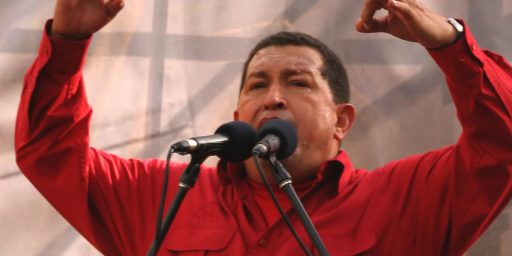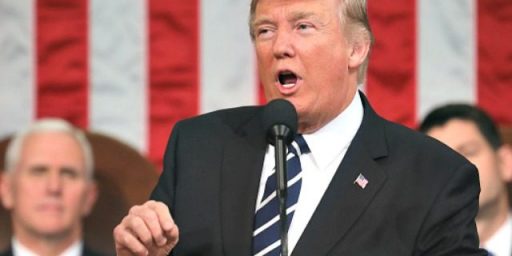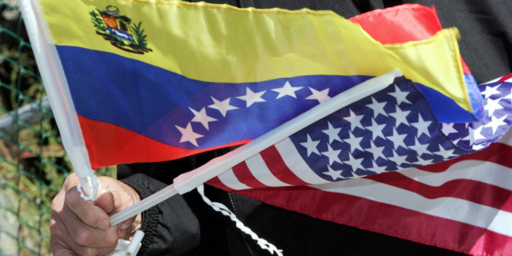Hugo Chavez Dies
News reports are just breaking that Venezuelan President Hugo Chavez has died:.
CARACAS, Venezuela — President Hugo Chávez has died after a long battle with cancer, the government announced Tuesday, leaving behind a bitterly divided nation in the grip of a deepening political crisis that grew more acute as he languished for weeks, silent and out of sight in hospitals in Havana and Caracas.
His departure from a country he dominated for 14 years casts into doubt the future of his socialist revolution. It alters the political balance in Venezuela, the fourth-largest foreign oil supplier to the United States, and in Latin America, where Mr. Chávez led a group of nations intent on reducing American influence in the region.
Mr. Chávez changed Venezuela in fundamental ways, empowering and energizing millions of poor people who had felt marginalized and excluded.
But Mr. Chávez’s rule also widened society’s divisions. His death is sure to bring more changes and vast uncertainty as the nation tries to find its way without its central figure.
With the president’s death, the Constitution says that the nation should “proceed to a new election” within 30 days, and that the vice president should take over in the meantime. The election is likely to pit Vice President Nicolás Maduro, whom Mr. Chávez designated as his political successor, against Henrique Capriles Radonski, a young state governor who ran against Mr. Chávez in a presidential election in October.
But there has been heated debate in recent months over clashing interpretations of the constitution, in light of Mr. Chávez’s illness, and it is impossible to predict how the post-Chávez transition will proceed.
Mr. Chávez’s supporters wept and flowed into the streets in paroxysms of mourning.
Mr. Chávez was given a diagnosis of cancer in June 2011, but throughout his treatment he kept many details about his illness secret, refusing to say what kind of cancer he had or where in his body it occurred. He had three operations from June 2011 to February 2012, as well as chemotherapy and radiation treatment, but the cancer kept coming back. The surgery and most other treatments were done in Cuba.
Then on Dec. 8, just two months after winning re-election, Mr. Chávez stunned the nation by announcing in a somber televised address that he needed yet another surgery.
That operation, his fourth, took place in Havana on Dec. 11. In the aftermath, grim-faced aides described the procedure as complex and said his condition was delicate. They eventually notified the country of complications, first bleeding and then a severe lung infection and difficulty breathing.
After previous operations, Mr. Chávez often appeared on television while recuperating in Havana, posted messages on Twitter or was heard on telephone calls made to television programs on a government station. But after his December surgery, he was not seen again in public, and his voice fell silent.
Mr. Chávez’s aides eventually announced that a tube had been inserted in his trachea to help his breathing, and that as a result he had difficulty speaking. It was the ultimate paradox for a man who seemed never at a loss for words, often improvising for hours at a time on television, haranguing, singing, lecturing, reciting poetry and orating.
As the weeks dragged on, tensions rose in Venezuela, and the situation turned increasingly bizarre. Officials in Mr. Chávez’s government strove to project an image of business as usual and deflected inevitable questions about a vacuum at the top. At the same time, the country struggled with an out-of-balance economy, troubled by soaring prices and escalating shortages of basic goods.
The opposition, weakened after defeats in the presidential election in October and elections for governor in December, in which its candidates lost in 20 of 23 states, sought to keep pressure on the government.
Then officials suddenly announced on Feb. 18 that Mr. Chávez had returned to Caracas. He arrived unseen on a predawn flight and was installed in a military hospital, where aides said he was continuing treatments.
Over nearly a decade and a half, Mr. Chávez built a political movement and a government that were centered on his outsize personality. He made most major decisions and dominated all aspects of political life. He inspired a fierce, sometimes religious devotion among his supporters and an equally fervent animus among his opponents. As many of his followers say: “With Chávez everything, without Chávez nothing.”
But that leaves his revolution in a precarious spot without its charismatic leader.
“In regimes that are so person-based, the moment that the person on which everything hangs is removed, the entire foundation becomes very weak because there was nothing else supporting this other than this figure,” said Javier Corrales, a professor of political science at Amherst College.
I’ll leave it to our resident commentator on Latin American affairs Steven Taylor to comment on what this might mean for the future of Venezuela, and US-Venezuelan relations. In the later regarding, though, I’d not that there’s at least the opportunity for the normalization of diplomatic relations between the two countries now that Chavez, who made a career out of sticking a thumb in the eye of the United States. Even if Chavez’s Vice-President ends up winning the election, he won’t be Chavez and the opportunity will exist to at least move beyond the Chavez years.
It looks like Steven Taylor and I were breaking the news at the same time. I’ll leave both posts up just to preserve the comment thread(s) that may develop.





I have had the opportunity to work in Venezuela…
I can tell you this: it will result in huge changes. Sadly, some not good.
On the plus side, there are many VZ companies that will thrive under a more free society.
Tourism will boom, no doubt.
However tbe social support of the underemployed will likely end… causing unrest.
May you live in interesting times, eh?
The “People’s Socialist,” who amassed a personal fortune of $2 billion … WTF ?